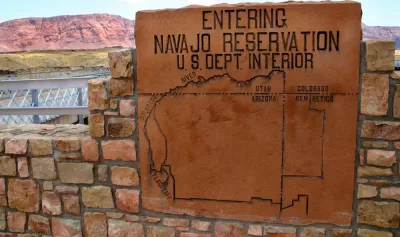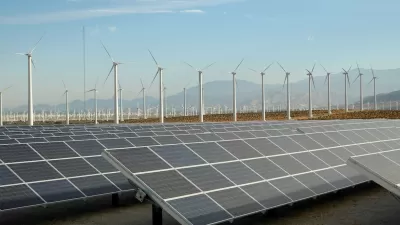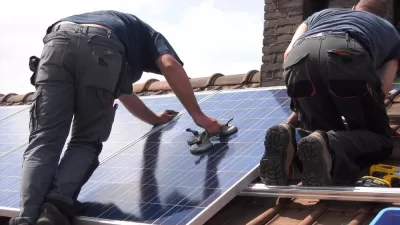Native American leaders in the Southwest want to ensure their communities have a voice, and an opportunity for well-paying jobs, in renewable energy projects on Native land.

As the United States prepares to transition its energy supply to renewable sources, writes Carl Segerstrom, leaders of Native communities that have for decades borne the brunt of fossil fuel-based energy production are working to ensure that they have a say in how the transition affects their regions and local residents.
According to an analysis released last year, transitioning to renewable fuels will create jobs for Native communities in New Mexico, Nevada, and Colorado. "Fossil fuel jobs will be lost, but the studies found that the investments to decarbonize would create large numbers of jobs relative to business as usual." The analysis included recommendations for creating sustainable, career-track jobs and mandating diverse hiring practices.
Despite the transition to new energy sources and technologies, most new jobs will be in traditional trades such as electricians, carpenters, and mechanics, expanding the number of jobs in general trades rather than specialized "green" niche work. As renewable industries create more well-paying careers, Navajo leaders like Joseph F. Hernandez, the Diné energy organizer for the NAVA Education Project, hope that "future generations can expand agriculture and diversify the local economy, rather than be forced to rely on industries that destroy the health of the land and people."
FULL STORY: Building equity into the renewable energy transition

Maui's Vacation Rental Debate Turns Ugly
Verbal attacks, misinformation campaigns and fistfights plague a high-stakes debate to convert thousands of vacation rentals into long-term housing.

Planetizen Federal Action Tracker
A weekly monitor of how Trump’s orders and actions are impacting planners and planning in America.

San Francisco Suspends Traffic Calming Amidst Record Deaths
Citing “a challenging fiscal landscape,” the city will cease the program on the heels of 42 traffic deaths, including 24 pedestrians.

Defunct Pittsburgh Power Plant to Become Residential Tower
A decommissioned steam heat plant will be redeveloped into almost 100 affordable housing units.

Trump Prompts Restructuring of Transportation Research Board in “Unprecedented Overreach”
The TRB has eliminated more than half of its committees including those focused on climate, equity, and cities.

Amtrak Rolls Out New Orleans to Alabama “Mardi Gras” Train
The new service will operate morning and evening departures between Mobile and New Orleans.
Urban Design for Planners 1: Software Tools
This six-course series explores essential urban design concepts using open source software and equips planners with the tools they need to participate fully in the urban design process.
Planning for Universal Design
Learn the tools for implementing Universal Design in planning regulations.
Heyer Gruel & Associates PA
JM Goldson LLC
Custer County Colorado
City of Camden Redevelopment Agency
City of Astoria
Transportation Research & Education Center (TREC) at Portland State University
Jefferson Parish Government
Camden Redevelopment Agency
City of Claremont





























